On May 1, general manager Brad Treliving and the Calgary Flames inked their promising young goaltender and back-to-back WHL Goaltender of the Year finalist Dustin Wolf to a three-year, entry-level contract. Assuming the Flames are unable to re-sign backup Cam Talbot or find a replacement for him, Wolf will compete with Jon Gillies and Artyom Zagidulin of the Stockton Heat, as well as Tyler Parsons, for the backup position behind David Rittich.
2018-19 Draft-Eligible Season
As far as draft-eligible seasons go, Wolf’s frankly couldn’t have gone better. With former Everett Silvertip starter Carter Hart leaving for greener pastures via the NHL, the reins were passed to Wolf who had some big shoes to fill. But he met every expectation and more.
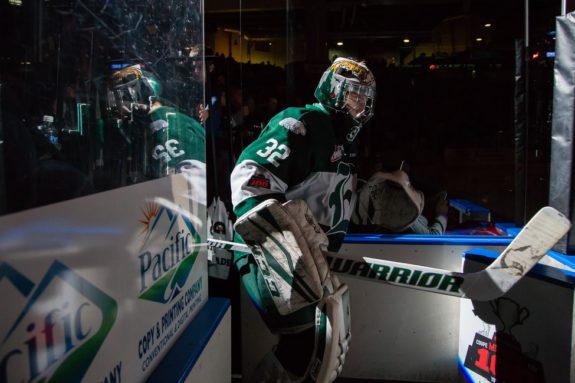
Wolf led the WHL in starts with 61, first in goals-against average (GAA) with a 1.69, first in save percentage (SV%) with .936, first in wins with 41 and was second in shutouts with 7. But his success went beyond stats; he was a Goalie of the Year finalist, losing to the previously-drafted Ian Scott, was on the WHL’s first all-star team and brought home both the WHL and CHL Scholastic Player of the Year Awards. He had made a solid argument to be a top goalie prospect in the upcoming draft.
Scouting Report
Wolf’s scouting report follows a very common theme of athleticism and speed. He is described as a very athletic individual whose physical assets include leg strength, agility and quick reflexes. He is able to combine these traits to establish his goaltending skills, with his top skills being lateral movement, and positioning. Wolf’s strong lateral movement and quick reflexes give him the ability to take away the bottom part of the net and, combined with his athleticism, gives him the ability to stop high-danger scoring chances such as cross-crease and back door passes.
But Wolf’s skills go beyond just lower-body strength and athleticism. He’s considered one of the most intelligent goaltenders in the draft. He uses this intelligence to strengthen many aspects of his game such as his positioning and play reading. He had some of the best positioning in the draft and is able to square up shots quickly and effectively and has a strong understanding of rebound control.
Wolf’s rebound control has been considered advanced for his age and gives him the ability to continuously position himself in front of these rebounds. He also has strong puck handling skills, which has been an attribute developed by the Everett system. He’s been described as capable of acting as a third defencemen on breakouts and able to make the long pass during the opposing team’s line change.
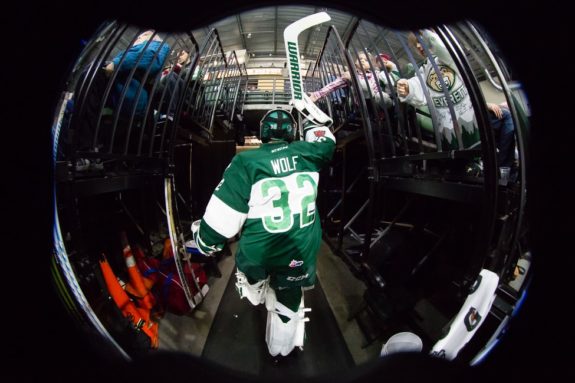
Wolf’s mental makeup is among the best and is described as cool, collected and intelligent by many scouts, former coaches and teammates. He is believed to be mentally sound, coachable and has a very good attitude. Overall, he is able to bring his intelligence and athleticism to form a solid goaltender with impressive technique.
Despite a very positive outlook on his scouting report, Wolf does have some pretty dangerous red flags. One major critique is that he sits low in his butterfly, and while this may be ok for an average netminder, considering he’s on the short side, it opens up lots of space above his shoulders. Even though he’s been credited with quick hands, he’s creating more work for himself. Some scouts fear that while he’s effective at covering the larger gap at the major junior level, the superior shooters in the NHL will be able to take advantage of that opening.
Similarly, while he’s prided himself on his lateral speed and ability to cover the bottom of the net, he heavily relies on this skill set to make up for his reduced butterfly size. Scouts are concerned that if Wolf can’t maintain and build upon his lateral speed and agility, he could fall behind in the faster-paced NHL style game. If he were to fall behind, he lacks the increased size to make up for this.
As well, much of Wolf’s progression depends on him growing into his body. While he’s slightly below average at 6-feet tall, he’s very wiry weighing only 166 pounds. If he isn’t able to grow into this body, he will be unable to fight through traffic and will lack the muscle mass needed to build upon his skill set.
Finally, because Wolf played on a very skilled team in Everett, some scouts believe his impressive stats may be inflated by simply playing in a good system.
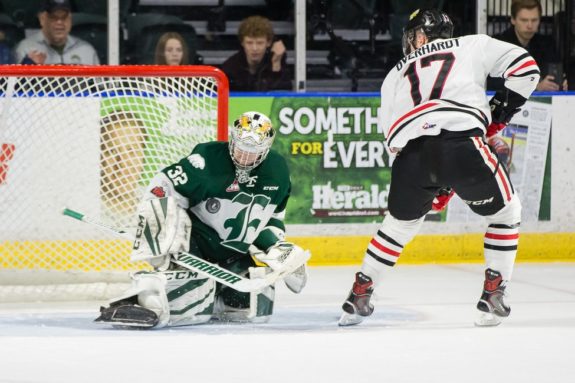
A common phrase used on scouting reports is “slightly undersized but a highly talented and athletic netminder.” As far as draft positioning goes, there was believed to be a wide window for Wolf to fall into, some had him as early as the 60s, believing him to be the second goalie drafted after Spencer Knight. But most had him falling in the 100-120 range. Future Considerations had him going 82nd overall and McKeen’s Hockey had him at 143rd, which was also his lowest projected selection. In an Elite Prospects article, he was cited as the fourth-best available goalie and projected him to be picked in the early to mid-60s.
The Draft Slide
When the draft finally came around in late June, Wolf’s projections were tossed away and he took a shocking slide. Once thought to be a top-five goalie and an almost sure-fire third-to-fifth round pick, slid all the way to the seventh-round, 214th overall. He was the fourth-last pick and 21st goalie selected.
A belief among experts was some teams feared that while he had some significant upside, many of his weaknesses were too substantial to fix and would end up being glaring soft spots throughout his career. Based on skill alone, there weren’t five goalies in the draft more skilled than Wolf so his drastic slide still came as a surprise to many. The slide was especially surprising considering some of the earlier picks such as Carter Gylander and Roddy Ross who are both backup goalies, Carter Gylander for the Sherwood Park Crusaders of the AJHL and Roddy Ross for the Seattle Thunderbirds in the WHL. Despite any of Wolf’s downsides, these other players lack the high-end potential of Wolf.
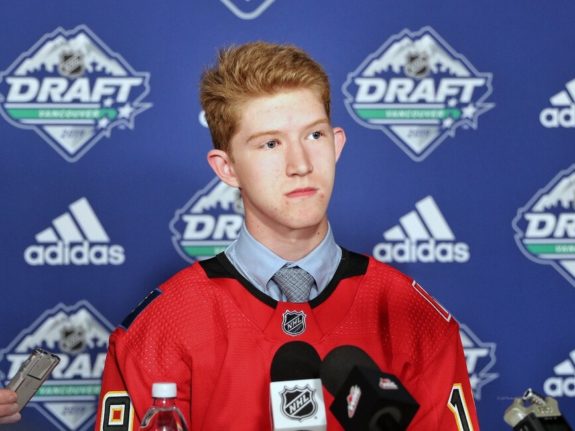
It all seems very strange when you think about how a goalie who led the WHL in nearly every stat and has a high ceiling was only four picks away from going undrafted. This is especially true when his downsides are predominantly ‘what ifs’ and not glaring defects in his ability.
Post-Draft Performance
Wolf has proven to be more than a one-hit wonder by continuing his dominance into the 2019-20 WHL season.
This season, Wolf put up a 1.88 GAA with a .935 SV%. He also earned 34 wins over 46 games and topped the WHL with nine shutouts. He was selected to represent the United States at the prestigious IIHF World Junior tournament as their backup. He was chosen over four of his fellow American netminders who were drafted before him. While the Americans had a less than impressive tournament, finishing sixth after being bumped in the quarterfinals, Wolf earned one start and posted an .850 SV% in a 6-3 win over Germany.
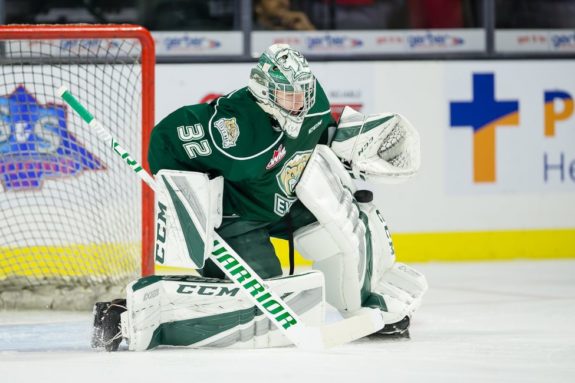
When the WHL season was canceled because of the Coronavirus pandemic, Wolf led the league in all goaltending stats. His GAA was ahead by 0.36 goals, save percentage by .006, and his nine shutouts were four higher than the next best. He was tied for wins with Joel Hoffer, both with six more wins than the next best goalie.
After his selection for the United States’ World Juniors team, one scout said Wolf had taken much of his criticism as a challenge and began fighting through screens and was getting better visibility than in seasons prior. He even said many teams had begun questioning whether they should have drafted him one to three rounds earlier, which was where many experts believed he should have gone in the first place.
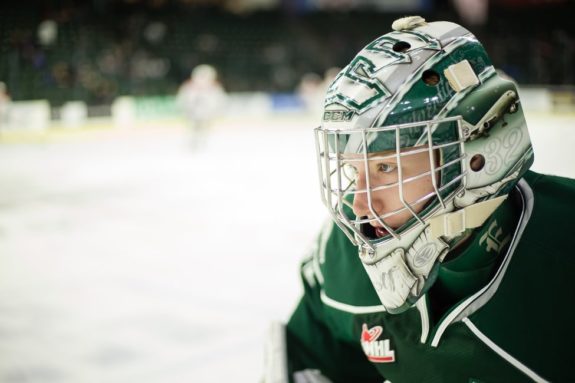
Treliving stole this young exciting goalie prospect in the 2019 Draft and with a new a three-year entry-level contract, Wolf could usher in a new era for the Flames franchise. We could be looking at the team’s first genuine starter since Miikka Kiprusoff who retired in 2013.
If management can set the ‘what ifs; aside and give Wolf a real shot, I believe we’re looking at a future NHL starter and maybe even the saviour the Flames have been searching for these past seven seasons.